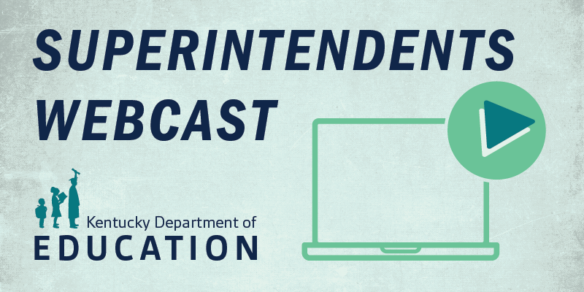
Kentucky Department of Education (KDE) representatives shared an update on Elementary and Secondary School Emergency Relief (ESSER) funding, as well as accountability standard setting during the June Superintendents Webcast.
The federal funding supports the safe and sustained return to in-person learning and expands equity by supporting students who need it most, particularly those most impacted by the COVID-19 pandemic.
ESSER funding was released as part of three different federal coronavirus relief packages. Kentucky received $193 million as part of the first round of ESSER funding. Robin Kinney, associate commissioner in the KDE Office of Finance and Operations, said $15,660 was returned to the U.S. Department of Education.
“We came awfully darn close to using 100% of the ESSER I allocation,” she said. “I want to express my appreciation on behalf of the department and also on behalf your students and your communities and your school districts for doing a great job and expending dollars in a very, very challenging time.”
The grant period for the second round of ESSER funding ends Sept. 30, and all reimbursement requests are due to KDE no later than Nov. 17. If districts don’t plan to use some of the ESSER II funds that were allocated to them, superintendents should notify Robin Morley with the KDE Office of Finance and Operations as soon as possible.
The grant period for the final round of ESSER funds from the American Rescue Plan (ARP) Act ends Sept. 30, 2024.
Stories highlighting how ESSER funding has helped Kentucky’s schools, districts and students can be found on Kentucky Teacher.
Accountability standard setting
Rhonda Sims, associate commissioner in KDE’s Office of Assessment and Accountability, provided an update on where the department stands with accountability standard setting.
KDE plans to host a workshop on indicator performance level descriptors and school performance level descriptors on June 22-23. A standard-setting workshop will follow on Sept. 13-15 before the final standard-setting report and accountability reports are issued in the fall.
Sims said the two workshops were held at the same time last year, but the department opted to spread them out this time around.
“We felt (last year) was a real pressure on people and it’s a little more complicated as we add (the) change (indicator) in,” said Sims.
The changes to the state accountability system started when state lawmakers passed Senate Bill 158 (2020), which amends KRS 158.6455 to create an accountability system for all public schools in the state using multiple measures that describe each district’s overall performance, along with the performances of individual schools and specific groups of students.
SB 158 requires districts to be evaluated on “status” and “change” for state indicators, which include student assessment results, progress toward achieving English proficiency by English learners, quality of school climate and safety, high school graduation rates and postsecondary readiness.
Status indicates how the school or district performed in the current year’s assessments, while change indicates how the school or district’s status changed compared to the previous year.
Sims said the standard-setting committee will include 30 people this year, including members from each geographic region of Kentucky. She said most members who served in 2022 returned this year.
The next Superintendents Webcast will be Aug. 8.




Leave A Comment